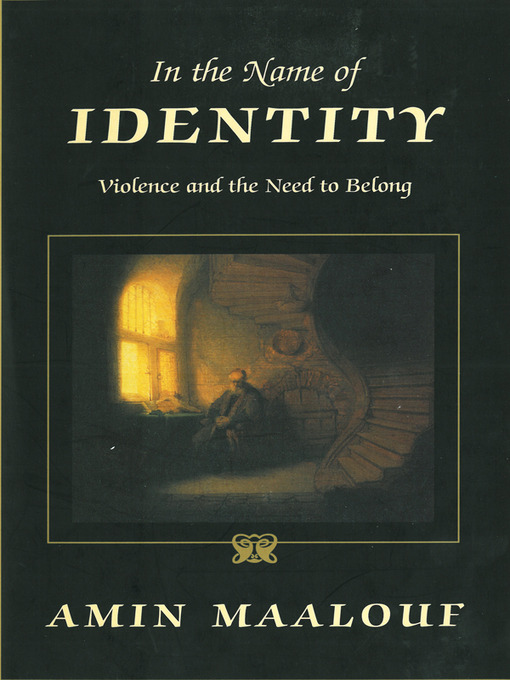In the Name of Identity is as close to summer reading as philosophy gets. It is a personal, sometimes even intimate, account of identity-in-the-world, not a treatise on the thorny metaphysics of identity. A novelist by trade, Amin Maalouf is a fluid writer, and he is aided by Barbara Bray's award-winning translation. His aim is to illuminate the roots of violence and hatred, which he sees in tribalistic forms of identity. He argues that our convictions and notions of identity—whether cultural, religious, national, or ethnic—are socially habituated and frequently dangerous. We'd give them up, he argues, if we thought more closely about them.Though the book has been heralded as radical and surprising, Maalouf essentially espouses an Enlightenment sensibility, a faith in the brotherhood of man. He is a believer in progress, arguing that "the wind of globalisation, while it could lead us to disaster, could also lead us to success." In fact, he envisions a globalized world in which our local identities are subordinated to a broader "allegiance to the human community itself." Maalouf wants us to retain our distinctiveness, but he wants it subsumed under the nave of common understanding.
- Everyone Reads: Social Emotional Learning
- Lonely Planet Travel Guides
- Spotlight on: Mental Health
- Deaf Culture, Experience, and History
- Autism Awareness
- Employment and Career Resources
- Black Lives Matter - Books for Young People
- Celebrate National Native American Heritage
- Latinx Authors
- Anti-Racist Reading
- Schomburg Center Black Liberation Reading List
- Books to Battle Quarantine Sleep Problems
- Never, Never, Never Give Up
- See all
- Newly added eBooks with no wait lists!
- eBooks: Best 2022 Adult Fiction Titles
- Most popular
- Just Added
- Books in Spanish/Libros en Español
- SciFi Old & New, Contemporary & Classic
- Read-Along Books
- Popular Mysteries
- Try something different
- Why Wait? Always Available Classics
- Comics and Graphic Novels
- Escape into History: Historical fiction
- Manga for Grownups
- See all
- All New Always Available Audio
- It's Your Lucky Day! Audiobooks+
- eAudio: Best 2022 Adult Fiction Titles
- Modern Scholar Audiobooks - NO WAITING!
- Legacy Washington Audio Collection - Listen NOW!
- Most popular
- Just Added
- Spanish/Audiolibros en Español
- Stranger than Fiction
- Try something different
- Family Road Trip Audiobooks
- You can't hit pause on these thrillers
- Best Audiobooks under 3 Hours
- See all
- 2023 Washington State Book Award Finalists (WSBA)
- Best of 2022: Adult Nonfiction
- Now's Your Chance!
- En español - lo nuestro
- Microhistories - Get down in the weeds with these intriguing titles!
- D-Day, June 6, 1944
- Unreliable Narrators
- Bibliotherapy
- Steampunk
- Dealing with Addiction
- Historical Fiction
- Presidents and Politics
- Laughing all the way to the bank
- See all


